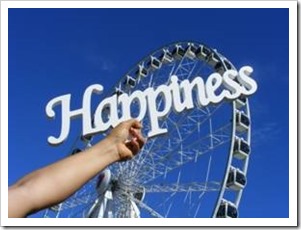
You will never be happier than you expect. To change your happiness, change your expectation
Bette Davis
During the holiday season, when people sum up the last year and get ready for the new year, we wish them a special wish of happiness. A simple, but the ultimate wish.
During the holidays, when the shops are full of people buying presents to each other, with much love and care, it is the best time to ask why.
Why do we buy things for each other? Why do we pay an expensive flight ticket to celebrate with the family? Why do we diet before a get together? Why do we clean the carpet just before the holidays? What is important to us in all of this? Why is it so important to us?
If we ask people what’s the most important thing in their life, they say “happiness”. Surprisingly, it’s not money, not success, not fame but happiness. Deep inside, we all know that the reason we buy things, get together with family, diet or clean the carpet is our desire for good, happy feelings.
Buying gifts is one of the ways we make one another happy. In a funny way, giving gifts is a win-win situation, where the giver benefits as much as the receiver does.

During any holiday season, I want to direct your attention to the greatest gift of all, the one that’s a bit harder for many people to give, the one we need to give ourselves.
We believe we were conditioned to think about others and, in a sense, spend most of our energy on doing the things we must, should and have to do, rather than the things we want, love and are happy to do.
Most of the coaching agenda is about shifting attention from what others expect from the client to what the client wants from himself or herself, from the “musts” and “shoulds” to the “wants”.
To make the shift, ask yourself this wonderful question every day
What do I want?
When we ask a person “What do you want?”, we get an embarrassed smile. The search for the answer gets lost somewhere. We can see it in the smile. “What do you mean?” is what we often get back. We mean “What do you want?”.As easy as it sounds, many people can’t answer this question. They can tell you what their mother, father, teacher, partner or kids want, but not what they want.
Think about it, the mind is running at full speed: “School fees. food. my boss. car insurance.” and then someone asks the question that stops it instantly. The answer at this stage is not important at all. Answers will come after the direction changes.
Try this on yourself when you’re confused or frustrated, or try this on others. The change in focus in tremendous.
To enhance the shift, add this wonderful question every day
What makes me happy?

Because if the most important thing for us is to be happy, shouldn’t we dedicate most of our time to study our own happiness?
One of the greatest shifting activities we do with our clients is called “100 things that make me happy.” Focusing on the things that make us happy diverts our focus in life from what we don’t have to what we have, from complaining to appreciation, from negative to positive, from sadness to happiness.
Try this: make a list of 100 things that make you happy
Finding 100 things is not easy. At first, most people think of big things – a big house, a fast car and so on – but when we get to the 10th item on the list, it is as if we go deeper into our being, into the magic land, where a smile, a flower, singing, eating a mango or sitting on the beach can make us as happy as the big things would. In a strange way, our mind registers similar amount of happiness whether the cause is big or small.
Surprisingly, children find it very hard to write the things that make them happy. From a position of lack (well, they don’t have their own money), they write many material things they need to possess in order to be happy.
During holidays, millions of people support this concept of happiness by buying presents and linking material possessions with happiness. Children find it hard to think of 100 things that make them happy, not because they’re not happy, but because they don’t have a good definition of happiness.
Unfortunately, the definition does not fall from the sky one day, and those kids, if not taught, will grow up to be stuck on the 20th thing that makes them happy.
One of the greatest challenges of making this list is that many people feel that their happiness depends on others, e.g. “I’m happy when Gal brings me flowers.” A situation like this gives Gal the control over my happiness, when that control should stay with me. If flowers make me happy, I can choose to be happy when I see flowers in the shop, on the side of the road or when I buy them for myself.
One of the best ways to complete the list is to ask other people for ideas. Not all their ideas will suit you directly, but they can get you thinking, e.g. “Well, eating watermelon doesn’t make me happy, but eating mango does”, or “Swimming doesn’t make me happy, but walking barefoot on soft sand does”.
You see, happiness accumulates. Some of these things you do every day and require little or no money: hugging, kissing, hot shower, hot chocolate.
In our relationships with our partners, children, parents, siblings, friends and colleagues we are trapped in this guessing game of what to do to make them happy. We tend to do things that would fit into our own list, because they’re the happiness-causing things we know.
Looking at other people’s lists can save us from guessing. A quick peek at Gal’s list showed me there is not point making him hot chocolate to make him happy, because with the same effort I can make him coffee. A quick peek at my list gave Gal the idea of attaching a flower to a note he wrote me on the mirror.

In the fifth session, she asked to show the group the 100 things that made her happy. She brought a beautiful album, titled “Things that make me happy”, where she had pasted 100 small pieces of paper with the things that made her happy. Everyone was very excited about her list, sharing their difficulties of coming up with their own lists.
She went on to say she looked at the list with her husband just before she came and realised that she’d had a great day because she had done so many things from her list. It was a change of focus for her.
After everyone was inspired by her album, she told the group that the same man who didn’t like her to come to the sessions, shifted his focus too without taking part in our group. He looked at her list with her, fully supporting her taking part in the focus group and told her he bought a bottle of Bailey’s to drink together when she came back from the focus group, because he’d seen Bailey’s written on her list. A happy ending to a happy day.
Writing down the things that make you happy is a good way of putting some order in the load of emotions. The thinking process can bring you to one of two conclusions:
- It’s very hard. I have only 25 things. No wonder I don’t feel happy
- Wow, I have so many. I actually have a lot of happiness in my life
During holiday seasons, give yourself a gift , a list with the 100 things that make you happy. If you’re generous, give yourself 200.
- Write a list of 100 things that make you happy
- Write responsible things, i.e. things that are within your control to do or to get
- Write simple things that can make you happy without having to spend too much money
- Ask family members or friends for ideas to add to your list
- Post your list in a visible place
- Look at your list every morning to motivate yourself
- Look at your list every evening to realise you had a happy day
- Add happy things to your list. The more you have, the happier you life will be
And until this list is full, Be happy in life!
Ronit











